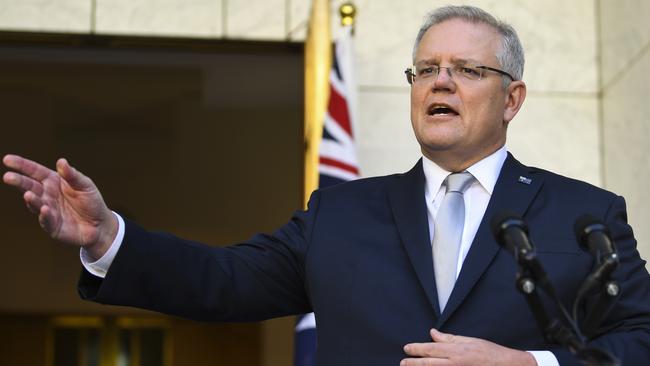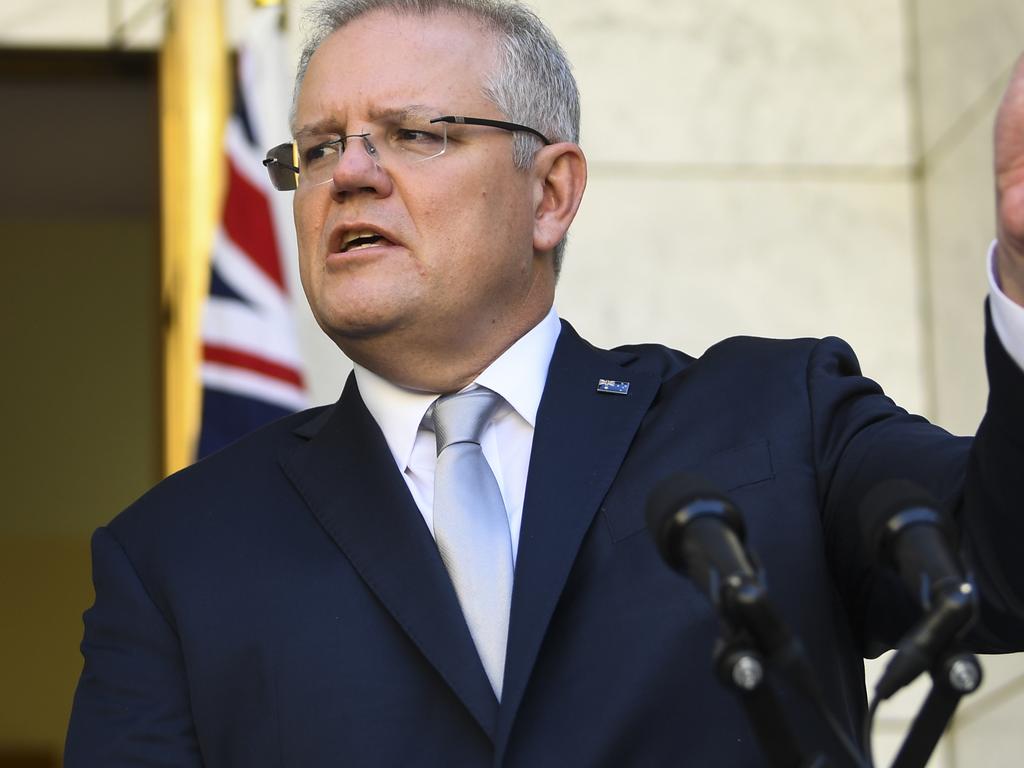Coronavirus: Big banks join business bailout
Banks are negotiating a multi-billion-dollar business rescue package that could see taxpayers underwrite loans to small and medium-sized firms facing collapse.

The big banks are negotiating a multi-billion-dollar business rescue package with the Morrison government that could see taxpayers underwrite loans to small and medium-sized firms facing collapse, in a bid to avoid mass job losses and a deep recession.
The Australian understands the government is considering a loan guarantee to keep businesses afloat as part of Scott Morrison’s second-round economic rescue package, which could take the total government spend to more than $40bn.
Any guarantee would be time limited, potentially for six months, to reduce taxpayers’ exposure and could be tied to further pledges from the banks to include loan repayment “holidays”.
A bank deposit guarantee was used as part of the response to the global financial crisis but did not extend to sharing risk on loans.
The Australian understands two options are under consideration, one based on the British model where the government has stepped in to guarantee small and medium enterprises up to £330bn ($667bn). However, the banks have been pushing for a version of the New Zealand model, which would involve cash payments to businesses to prevent them laying off staff. The banks favour the New Zealand scheme because of concerns that businesses may be reluctant to take on additional debt during an economic downturn.
The second major economic intervention — due to be finalised within days — comes as the Prime Minister warned of “severe economic implications” after announcing drastic emergency health responses. Mr Morrison, who will take part in a virtual G20 leaders’ summit next week, will meet Treasurer Josh Frydenberg on Thursday ahead of finalising their business and jobs package through cabinet’s expenditure review committee.
Mr Morrison said unprecedented safety measures, which included limits on public gatherings and restrictions on travel, would trigger “very significant economic impacts”.
Reserve Bank governor Philip Lowe on Thursday will announce a program to purchase Australian government bonds and potentially offer cheap funding for banks to lend to small and medium-sized businesses. The RBA is also expected to cut rates to a record low of 0.25 per cent, which would be the first out-of-cycle rate cut since 1997.
Mr Morrison said the impact of COVID-19 was “spreading more broadly across the economy”, with the tourism and aviation sectors under immediate pressure.
“The government is considering, quite extensively, further economic measures that will deal with the strength and the strengthening of our safety net and cushioning the even greater impact of the coronavirus on the Australian economy, particularly on small businesses and individuals,” the Prime Minister said.
GRAPHIC: Life in the age of COVID-19
New ANZ research showed the partial shutdown of the economy over a number of weeks would deliver a $40bn hit to the economy in the June quarter and 175,000 job losses by the end of the year, pushing the number of unemployed Australians to more than one million.
ANZ warned the economy would contract by 2 per cent in the June quarter, driving Australia into its first recession since 1991, with the jobless rate surging to 7.8 per cent by the end of the year.
The Australian can reveal the unions have joined the push by the banks for an urgent increase in the response to COVID-19, directly lobbying Australian Banking Association chief Anna Bligh. In a letter sent to Ms Bligh, Unions NSW secretary Mark Morey, who represents more than 600,000 members, endorsed a government guarantee under which banks commit to deferring mortgage payments for the rest of the year.
“A rash of foreclosures would do enormous social and economic damage, shattering confidence and potentially plunging many working families into poverty,” Mr Morey wrote.
“During the global financial crisis, Australian banks received a government guarantee which allowed them to emerge in a position of strength and well-capitalised. We now request the banks reciprocate that goodwill.”
Mr Morey said Unions NSW was not advocating for debt forgiveness but the “ability to restructure loans and add payments to the back end of the loan term”.
“Solutions must be forged across traditional partisan lines,” he said. “I therefore seek your co-operation to ensure there are no bank foreclosures as we navigate this initial phase of this crisis.”
The big banks have been urging the government and regulators to provide relief from “unquestionably strong” capital ratios enforced by the Australian Prudential Regulation Authority. This would enable them to lend more to customers without fear of breaching their minimum, 10.5 per cent capital ratios.
New Zealand announced a $NZ12.1bn ($11.94bn) stimulus package on Tuesday that featured cash injections through wage subsidies and transfer payments to households. Bankers said they favoured such cash payments because they avoided an extra layer of government bureaucracy.
US President Donald Trump is pushing congress to approve a $US1 trillion ($1.67 trillion) stimulus plan that would hand cash payments to households within two weeks.
Mr Morrison said the “same principles” that were applied to his $17.6bn stimulus were being considered in the design of the rest of the government’s rescue package.
“The task is different to the one that the Treasurer and I spoke of last week,” the Prime Minister said. “I can’t understate the significance of the gear change that occurred last weekend. The gear change, when we were moving to far more widespread social distancing and bans on gatherings and all of this, this has a much more profound impact on the economy.
“And there are many things that will be hard to predict going forward, but as we adjust and upgrade and scale our response, then that will also require adjustment to other responses that we’re making.”
Mr Morrison, who confirmed the May 12 budget was under review amid tough new coronavirus safety measures, said workforce management was “critical”.
S&P Global Ratings Asia Pacific chief economist Shaun Roche identified Australia as “an example of an economy vulnerable to labour market shocks”. He said the problem was “more acute” in the accommodation and catering sectors, which accounted for 7 per cent of total employment.
Mr Morrison said life was “going to continue to change”, with coronavirus expected to span a minimum six-month period.
“This is a once-in-100-year type event. We haven’t seen this sort of thing in Australia since the end of the First World War,” he said.
Westpac chief economist Bill Evans released forecasts on Wednesday tipping a recession and predicting unemployment would peak at 7 per cent in October.
Additional reporting: Patrick Commins







To join the conversation, please log in. Don't have an account? Register
Join the conversation, you are commenting as Logout